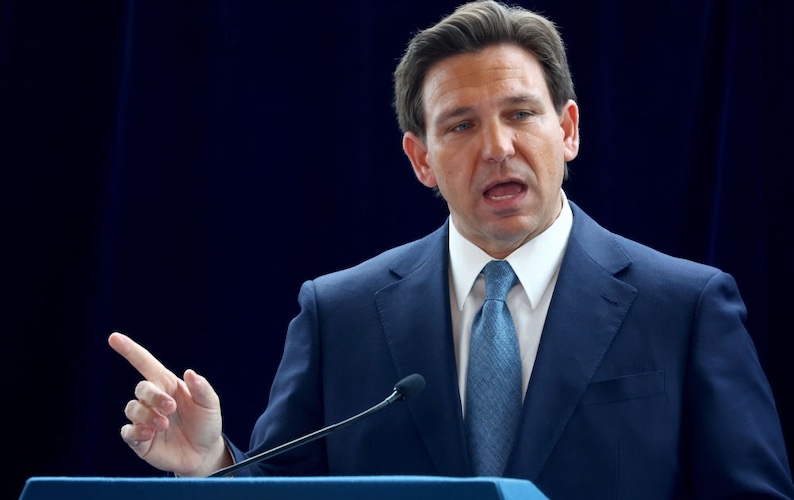
TALLAHASSEE (LifeSiteNews) – The Florida Office of Election Crimes & Security is investigating tens of thousands of petitions submitted in support of a ballot initiative to codify abortion-on-demand in the Florida Constitution, citing concerns that a “substantial number of voter signature forgeries were submitted” by the initiative’s proponents.
Amendment 4, the so-called “Amendment to Limit Government Interference with Abortion,” states that “no law shall prohibit, penalize, delay, or restrict abortion before viability or when necessary to protect the patient’s health, as determined by the patient’s healthcare provider.” If enacted, it would require abortion to be allowed for any reason before fetal “viability” and render post-“viability” bans effectively meaningless by exempting any abortion that an abortionist claims is for “health” reasons. Direct abortion is always gravely immoral and is never needed nor justifiable to protect a mother’s health.
If successful, Amendment 4 would overturn Florida’s six-week abortion ban.
The amendment ostensibly says that it “does not change the Legislature’s constitutional authority to require notification to a parent or guardian before a minor has an abortion.” But DeSantis has warned that “there’s a difference between consent and notification. Notification is after the fact. The consent is obviously a condition precedent. They did that because they know going after parents’ rights is a vulnerability.”
JUST IN: Gov. Ron DeSantis reacts to reports of police of investigating potentially fraudulent signatures for pro-abortion ballot initiative
“Our tolerance in the state of Florida for any type of election-related fraud is zero.” pic.twitter.com/v0xu1Hqsl7
— Florida’s Voice (@FLVoiceNews) September 9, 2024
Florida’s Voice reports that investigators are looking into signatures from “nearly 37,000 submitted petitions” gathered by 35 individuals, following examples of the signatures of dead people and non-matching signatures, as well as reports from people who did “not sign the petition forms submitted in their names” – including a personnel member in the Osceola County Supervisor of Elections.
“The circulators appeared to have forged the voters’ signatures and inserted the voters’ personal identifiable information into the petitions without consent,” according to a letter from the state. “The petition forms indicate that the above-listed individuals are the paid circulators who collected the petitions.” Officials are “concerned that a substantial number of voter signature forgeries” were rubber-stamped as valid by local supervisors.
Accordingly, the government is now asking individual counties to review their petitions and having law enforcement going to visit signatories to confirm whether or not their signatures are genuine, NBC affiliate WESH reports.
It is unclear exactly how many signatures could be affected, but “we are working on compiling findings and will refer these to appropriate authorities in the near future,” Florida Department of State spokesperson Mark Ard told Axios. The pro-abortion “Floridians Protecting Freedom” group needed a minimum of 891,523 signatures to get on the ballot and collected 997,035, meaning well over 100,000 phony signatures would need to be found and stricken in order to remove Amendment 4 from November’s ballot.
“Anyone who submitted a petition that is a valid voter, that is totally within their rights to do it,” DeSantis said on Monday when asked about the investigation and the visits to signatories. “We are not investigating that. What they are investigating is fraudulent petitions. We know that this group did submit on behalf of dead people.”
The next day, the governor doubled down on his zero-tolerance approach to potential fraud. “We can’t be in a situation where people are trying to short circuit the process by submitting invalid petitions,” he said.
The abortion lobby has had great success using false claims that pro-life laws are dangerous to stoke fear about the issue among the general public, most visibly in the area of state constitutional amendments embedding “rights” to abortion immune from future legislation.
Pro-lifers have either failed to enact pro-life amendments or stop pro-abortion ones in California, Kentucky, Michigan, Montana, Vermont, and Ohio, prompting much conversation among pro-lifers about the need to develop new strategies to protect life at the ballot box, as well as a debate among Republicans over the political ramifications of continuing to take a clear pro-life position.
Constitutional amendments require 60 percent of the vote in Florida (as opposed to the simple-majority threshold in states such as Michigan and Ohio), and polls have disagreed as to whether the amendment can reach it.
Between that, DeSantis’s activism against the amendment (including the launch of a political committee dedicated to defeating it and lobbying other Florida Republicans to speak up), and the GOP’s unprecedented million-count voter registration advantage in the Sunshine State, both sides are deeply invested in the outcome of Florida’s abortion battle this fall, which will either continue or break that trend.

